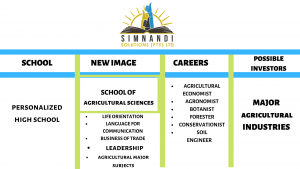Agriculture refers to the science or practice of farming, including cultivation of the soil for the growing of crops and the rearing of animals to provide food, wool, and other products. Our country is highly capable, not only to feed itself and eliminate hunger and food insecurity, but also to be a major player in the continental food markets. This potential lies in its land, water and oceans, in its men and women, in its knowledge and huge markets. This means that agricultural expertise and knowledge is very important, and this challenges the curriculum to accommodate the agricultural interest that dwells within some of our learners. This paper seeks to argue the importance of agricultural studies in the curriculum. The paper will further urge the explicit introduction of agriculture and how easy this could be achieved under the personalized education curriculum system (PECS).
Agriculture forms a significant portion of the economies of all African countries, as a sector it can therefore contribute towards major continental priorities, such as eradicating poverty and hunger, boosting intra-Africa trade and investments, rapid industrialization and economic diversification, sustainable resource and environmental management, and creating jobs, human security and shared prosperity (NEPAD, 2013). Ayesha J, 2020 shares the same sentiments by revealing that Agriculture plays a vital role in economic development of developing countries. The role of agriculture in economic development is crucial because most of the population of the developing countries depend on their own agriculture to provide food for consumption. In 2015 the country was importing almost 50% of wheat consumed. On the positive side, this process gave fruit and grape producers access to the international marketplace where they compete quite successfully. During the 1990s and 2000s, exports in these items grew at an average of 6,5% per year, thereby increasing their share in total agricultural exports from 29% to 68%. The fact that the sector represents less than 2,5% of the economy does not provide the true picture of the sector’s impact on the greater economy since the sector does not operate in a vacuum – it buys inputs from the manufacturing sector, provides raw materials for manufacturing and purchases a host of services(Greyling, 2015). It should further be noted that role of the sector as food provider is particularly relevant for food security purposes. In general, food security is defined as having reliable access to enough affordable, nutritious food.
Statistics in 2015, according to (Greyling, 2015) on agricultural employment differed according to definition and source, but it is safe to say that the sector employed around 700 000 workers. This makes the sector one of the biggest employers in the economy. It is also important to note that the sector is labour-intensive compared to other sectors, because it employs about 4,6% of the total labour force. The mining and manufacturing sectors, in comparison, represent 8,5% and 12,5% of the economy whilst employing only 2,3% and 11,8% of the labour force, respectively. The agricultural sector therefore uses two units of labour per unit of value added, whilst the ratio is 0,3 and 0,94 for the mining and manufacturing sectors. Greyling, 2015 concluded that the South African agricultural sector continues to play an important role in the economy regardless of its declining share in GDP. Contrary to popular belief, the country is not self-sufficient in its food supply, but does not operate as a net importer of agricultural products due to the exports of high value items such as fruit and wine.
The importance of agriculture is undeniable! The NCS offers Agricultural studies options in their curriculum, however the degree of the importance of agriculture in south Africa does not allow agriculture to be rolled out as it is currently. Agriculture in schools under NCS is just a subject a learner takes alongside other subjects irrelevant from Agriculture. And not all the schools have an option of agricultural studies, some schools do not offer it at all! If agriculture plays such a humongous role in the economic developmental zones, surely Agricultural studies introduction should be reconsidered for a better roll out than it is currently. This is because learners interested solely in agricultural studies would be disrupted by other subjects imposed to them by the NCS curriculum policies that force a learner to study other irrelevant subjects alongside the relevant subject a learner chose.
Personalized education curriculum system (PECS) proposes a strict focus schools of Agricultural Sciences. These schools will offer subjects such as English for communication, not literature, Life Orientation, Farming, Livestock Production Systems, Agricultural Meteorology, Soil formation and chemistry, Pedology and Soil Classification. These subjects are relevant and suitable for a learner interested in pursuing a career in Agriculture. With Agricultural sciences schools structured in this manner, the economic power agriculture holds is preserved and invested in young minds. This is how PECS believes education should be structured. See the visual below:

NB: Personalized education curriculum system (PECS) is explained in details here: https://www.youtube.com/watch?v=-tqofH2qkSU


